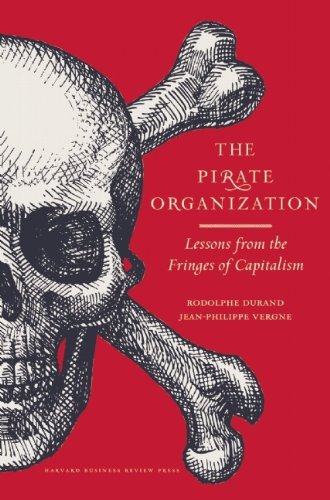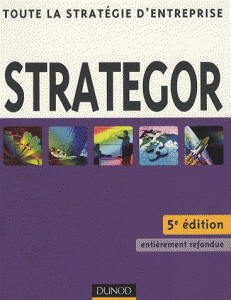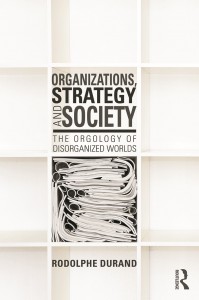 Durand R. (2014) Organizations, Strategy, and Society- The Orgology of Disorganized Worlds, Routledge
Durand R. (2014) Organizations, Strategy, and Society- The Orgology of Disorganized Worlds, Routledge
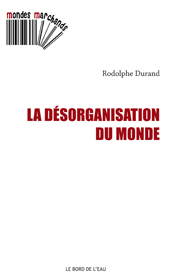
First edition (2013) La Désorganisation du Monde, Editions Bord de L’eau.
wanna buy the book? se procurer le livre?
Organizations are ubiquitous, from clubs and associations to firms and public agencies. They confer meaning to all of us, and our attachment to and membership of organizations have a profound effect on all areas of our lives. However, in our increasingly turbulent world, these organizations run the risk of disappearing or losing their legitimacy, creating a sense of pointlessness and absurdity. Organizations, Strategy and Society: The Orgology of Disorganized Worlds draws on neo-institutional and strategy theories of competitive advantage and develops an integrative approach to theorizing organizations and their behaviors, termed ‘orgology’. It explains that organizations can act strategically to protect and renew the meaning that individuals give to their lives. In so doing, organizations that survive and thrive impose their logics on society, thereby influencing what is legitimate or not. In turn, individuals must reinterpret their multiple associations with organizations and contribute to reinforcing or inhibiting social evolutions. This new way of understanding organizations’ relationships with society results in a reconsideration of management and the role of individuals in building their future.
Durand R. and JP Vergne (2012) The Pirate Organization – Lessons from the fringes of Capitalism, Harvard Business Review Press
First edition (2010) L’organisation pirate – essai sur l’évolution du capitalisme, Editions Bord de L’eau. 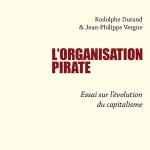
wanna buy the book? se procurer le livre?
When capitalism spread along the trade routes toward the Indies…when radio opened an era of mass communication… when the Internet became part of the global economy…pirates were there. And although most people see pirates as solitary anarchists out to destroy capitalism, it turns out the opposite is true. They are the ones who forge the path. In « The Pirate Organization, » Rodolphe Durand and Jean-Philippe Vergne argue that piracy drives capitalism’s evolution and foreshadows the direction of the economy. First published in French to great critical acclaim and commercial success as « L’Organisation Pirate: Essai sur l’évolution du capitalisme, » this book shows that piracy is not random. It’s predictable, it cannot be separated from capitalism, and it likely will be the source of capitalism’s continuing evolution.xx
xxx
Strategor (2009) Garrette B., Dussauge P., and R. Durand (eds), Vth edition, Dunod
The leading French textbook on Strategy, collective work of HEC Strategy department.
xx
xxx
xxx
Durand R. (2006), Organizational Evolution and Strategic Management,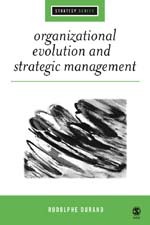 Sage, London.
Sage, London.
Evolutionary researchers need to attend more carefully to historical and contemporary debates in the biological sciences if they are to avoid false tracks and simplistic analogies. This book offers the foundations of a distinctive and authentic evolutionary theory that takes organizations seriously for what they are’ – Richard Whittington, Oxford University
`This book fills an important gap in the study of organizations and strategy from an evolutionary perspective. Durand’s OES model, rooted in a critical examination of philosophical and scientific writings on evolution, is particularly promising and provides a valuable guidepost for future research on organizations and strategic management’ – Michael Lounsbury, University of Alberta
This book is the first of its kind to propose a solution to this theoretical puzzle and engage readers in a balanced understanding of organizational evolution. Chapters include an examination of the work by Lamarck, Darwin and Spencer; a constructive appraisal of evolutionary theory applied to organisations and a summary of how the organizational evolution and strategy model will affect future theory and research.
xxx
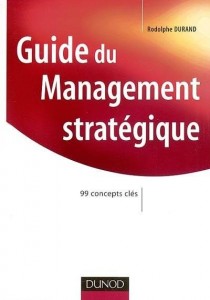 Durand R. (2003), Guide du Management Stratégique, Dunod, Paris
Durand R. (2003), Guide du Management Stratégique, Dunod, Paris
This book (in French) contains 99 concepts of strategy, all defined, illustrated by an example and related to relevant academic research. Each concept is then related to others, contained in the book, enabling a hyper-text reading of the content –hence enabling the reader to reflect on a particular strategic question in a non-linear way.
xxxxxx
Durand R. (2002), Développement de l’organisation,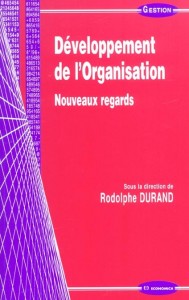 Nouveaux Regards, Economica
Nouveaux Regards, Economica
Edited collective volume on debated theories of organization. It contains 8 chapters on: organizational selection, real options, corporate governance, organizational acculturation, organizational learning, organizational justice, auto-organization, and philosophy and logics.
xxx
xxx
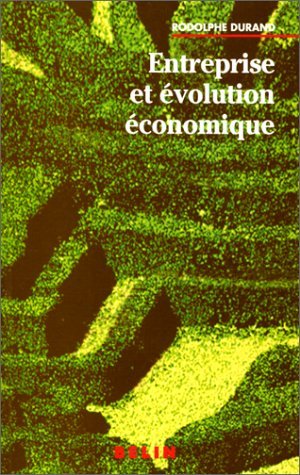 Durand R. (2000), Entreprise et Evolution Economique, Editions Belin.
Durand R. (2000), Entreprise et Evolution Economique, Editions Belin.
This book is a journey that starts with a questioning about economic evolution. In order to avoid logical traps and analogical errors, the reader needs to enter the management territory where different models confront each other. On her way to destination, the reader collects knowledge and ideas about firms’ strategies and why future strategic moves are conditioned on current resources controlled by firms. The book ends with the list of tentative answers to the opening questions.
xxxxx
Marois B., M.A. Andrieux and R. Durand (1997), Chômage et relance de l’emploi – Le point de vue des entreprises, Economica.
- « Strong in the morning, dead in the evening: a genealogical and contextual perspective on organizational selection« , in The Globalization of Strategy Research (Advances in Strategic Management, Volume 27), Professor Joel Baum (ed.), Emerald Group Publishing Limited, 2010, pp. 279-312 (in coll. with M. L. Djelic).
- « (Un)Great Expectations- Effects of underestimations and self-perception on performance », in Handbook of Research on Foresight and Strategy – forthcoming, L. Costanzo (ed.), Edward Elgar Publishers, Londres, 2009.
- « Practical wisdom and emotional capability as antecedents of organizational accountability in revolutionary change processes », in Research on emotion in organizations, N. Ashkanasy, W. Zerbe, C. Hartel (Eds), Emerald Group Publishing Limited, 2008, chap. 14 (in coll. with Q. Huy).
- « Competence systemics and survival: Simulation and empirical analyses », in Competence Perspectives on Resources, Stakeholders and Renewal, R. Sanchez, A. Heene Eds, Elsevier, Amsterdam, 2005, vol. Advances in Applied Business Strategies, pp. 33-58 (in coll. with Z. Guessoum).
- « Can illusion of control destroy a firm’s competence? The case of forecasting ability », in Strategic Foresight, H. Tsoukas and J. Shepherd (eds), Blackwell, Oxford, 2004, pp. 109-130.
- « Linking Competencies, Sustainable Competitive Advantage, and Performance: An Empirical Investigation », inResearch in Competence-Based Management, R. Sanchez, A. Heene (Eds), Jai Press, 2000, chap. 6 (in coll. with B. Quélin).
- « The relative contributions of inimitable, non transferable and non substitutable resources to profitability and market performance« , in Dynamic Strategic Resources, Hitt M. et al (eds), J. Wiley, 1999, pp. 67-95.
- « Performance de l’entreprise, sélection économique, et liberté individuelle », in La performance, une nouvelle idéologie ?, B. Heilbrunn (ed), La Découverte, 2004, pp. 121-133.
- « Théories de la sélection et développement organisationnel », in Développement de l’organisation, Nouveaux Regards, R. Durand (ed.), Economica, 2002, pp. 17-36.
- « Théorie des options réelles et développement stratégique », in Développement de l’organisation, Nouveaux Regards, R. Durand (ed.), Economica, 2002, pp. 37-55 (in coll. with P. Y. Gomez, P. Monin).
- « Construire son statut, un atout stratégique », in L’Art du Management 3, HEC Paris, Dunod, Paris, 2005, pp. 349-353.
- « Transactions, Ressources, et croissance de la firme », in Regards de la Stratégie sur l’Economie des Coûts de Transaction, P. Joffre, O. Germain (eds), Vuibert, 2001, pp. 111-127 (in coll. with P. Y. Gomez).
- Durand R. and Gomez P-Y (2001) “Transactions, Ressources, et croissance de la firme”, in Joffre P. et Germain O. (eds), Regards de la Stratégie sur l’Economie des Coûts de Transaction, Vuibert, p111-127
- Durand R. (2000) “Un test répété de la contribution du Courant des Ressources à l’explication de la performance des entreprises”, in Durand T, Koenig G. et Mounoud E. (eds), Perspectives en Management Stratégique, EMS éditeurs, p129-152
- Durand R. (2000) “Analyse par les ressources de la performance des entreprises françaises”, in B. Quelin et J-L Arregle (eds), Le management stratégique des compétences, Ellipses, p83-127
- Durand R., and Quélin B. (1999), « Les contributions de la théorie des ressources à une théorie évolutionniste de la firme », in Basle et al. (eds.), Approches évolutionnistes de la firme et de l’industrie, L’Harmattan, p45-75
- Durand R. (1998), « Théorie évolutionniste et management stratégique », Nioche J.P. and Laroche H. (eds.) « Repenser la stratégie« , Vuibert, p135-165
- Durand R. (1996), « Une approche écologique de la relation environnement-stratégie « , in Perspectives en Management Stratégique, Tome IV, Economica, p279-309
- Durand, R. and Guessoum Z. (1995), « Intelligent agents for building models of firms evolution », in I.A. distribuée et systèmes multi-agents, Müller et Quinqueton (eds.), Eds HERMES, p45-56.
Book Reviews:
- R. Durand (2008) Logics of Organization Theory –Audiences, Codes, and Ecologies, by M. Hannan, L. Polos, and G. Carroll (2007) Princeton University Press, in Contemporary Sociology
- Durand R. (2014) The fruitfulness of disagreement – Reading “Logics of Organization Theory” (Hannan, Polos, and Carroll, 2007) and “The Emergence of Organizations and Markets, (Padgett and Powell, 2012), Academy of Management Review, 39: 387-396
